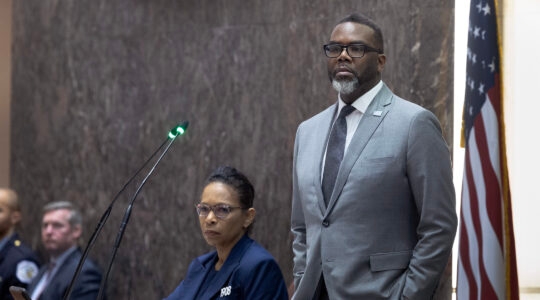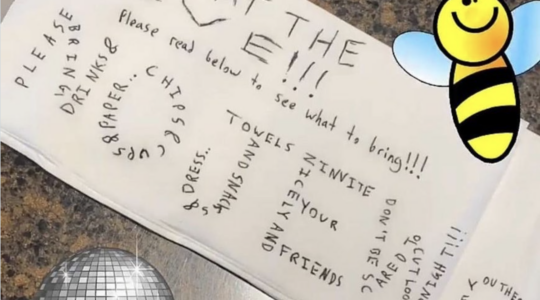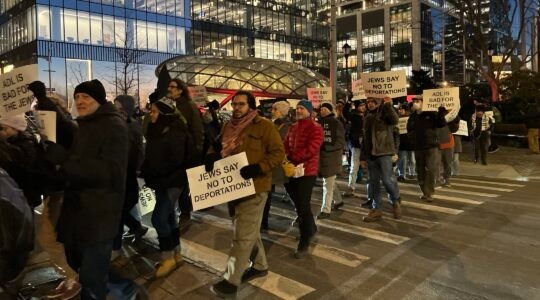SEATTLE (JTA) – After choking back tears several times in order to continue her testimony, Dayna Klein finally broke down and sobbed when she recalled fleeing the Seattle Jewish federation in July 2006 and passing her friend, Pamela Waechter, who was lying face up, dead, on the stairway landing.
Only a few minutes earlier, it was Klein who had come face to face with Naveed Afzal Haq, a Muslim-American man armed with guns and a grudge, in the doorway of her office. He shot her there.
Klein was four months pregnant and could only think of her unborn child’s safety.
“He said nothing,” she testified. “He shot at his first opportunity. He was aiming for me and I put my arm in front of my abdomen.”
According to the charges, Haq took direct aim at Klein’s pregnant stomach.
Haq left Klein bleeding from her gunshot wound to the forearm and crumpled on the ground where she fell. He announced that if anyone called 911, he would kill them when he returned.
Minutes later, Haq did return to Klein’s office to find that she had crawled to her desk, dialed 911, and was speaking with emergency operators from her desk phone.
That’s when Haq put the barrel of his gun to her head, complaining that she was “too “f–-in’ stupid to follow directions,” Klein testified, and he called her his “hostage.”
While she tried to be compliant, Klein also began to reach out to Haq. As she listened to his rage about the Jews and Israel, Klein said she offered him the phone and a would-be venue to air his views.
With his handgun continuously fixed on her and the telephone receiver in his other hand, Haq talked to 911 operators while he walked behind and around Klein, holding her at gunpoint the whole time. After speaking with the emergency operator for some time, he agreed to surrender.
In the courtroom Monday, seated between his defense attorneys, Haq was stoic and unmoved during Klein’s testimony. He shifted occasionally in his chair, while at other times he listened intently. Often he could be seen with his head hanging low and his shoulders slumping.
Haq’s attorneys have portrayed him as an agitated, angry psychotic who was the victim of ill-prescribed medications. But witness after witness, from the officer who stopped Haq for a routine traffic violation right before the shootings and testified he saw nothing that alerted his suspicions, to the arresting officers who first apprehended him at the scene, said he was “compliant.”
“He had normal speech and a conversational tone,” Klein told the court.
During cross examination, defense attorney John Carpenter asked Klein if she recalled statements Haq made to 911 operators about fairness, foreign policy, peace and “just making a point.”
She said she didn’t recall any of them.
The other victims who have gave their testimony of events that day – Cheryl Stumbo, Christina Rexroad, Layla Bush, Carol Goldman and 14-year-old Kelsey Burkum – all said Haq was calm and mild mannered when he first approached them and remained calm while he was shooting them.
Seattle Police Officer William Collins told jurors that according to information from emergency operators, Haq said he was going to kill his hostage and that he would not be taken alive.
When he voluntarily walked out the door shortly after that statement and surrendered to police, Williams said he was surprised by what he saw.
“We began to issue orders to him,” Williams told the court. “He was compliant. He obeyed and he answered all of our questions.”
Returning on Monday to provide more testimony was the crime scene investigator, Det. Don Ledbetter. He showed the jury spent bullet cartridges from a Smith & Wesson .45-caliber automatic pistol, one of two guns Haq brought with him to the Jewish federation that day.
Haq also had bought jacketed hollow-point bullets that expand inside the object they hit. In humans, they cause more bleeding, Ledbetter said.
While these bullets are ultimately safer for law enforcement – they reduce the possibility that the bullet will exit a suspect and injure an innocent bystander – they present serious consequences for innocent victims like the women at the Jewish federation that day.
Many of the victims underwent surgery at Seattle’s public trauma hospital, Harborview, immediately after the shooting.
Haq also had brought a knife with him that was protected by a leather sheath. Along with the guns, the knife was concealed in a black canvas laptop computer bag-type briefcase.
Ledbetter created more drama in the courtroom when he fired the empty gun that once belonged to Haq toward the floor, showing the jury how to load and fire the Smith & Wesson automatic pistol.
The second gun Haq bought to use that day was a used Ruger .45-caliber automatic pistol, which on Tuesday the manager of the gun shop, Scott Shoffstall, testified cost $324.89.
King County Deputy Prosecuter Erin Ehlert did not question Shoffstall about the exact cost of the Smith & Wesson handgun, which can cost between $500 and $600.
Haq bought both guns while living on public assistance.
Ledbetter was expected to complete his testimony Wednesday. Prosecutors hope to wrap up their case by the end of the week.
JTA has documented Jewish history in real-time for over a century. Keep our journalism strong by joining us in supporting independent, award-winning reporting.





